Key Summary
- UK vs New Zealand study abroad comparison shows equal overall outcomes, with both countries scoring 6 points based on universities, costs, admissions, work visas, salaries, and living expenses, making them equally strong study-abroad destinations depending on student priorities.
- UK universities rank higher globally and offer lower average tuition fees, with undergraduate costs ranging from £8,000–£30,000 and average graduate salaries of £29,500 per year, giving the UK an edge in academic reputation and post-study earnings.
- New Zealand offers easier admission requirements, lower overall living costs, and more accessible work permit and PR pathways, including a two-year residency criterion for PR and average postgraduate salaries reaching NZ$73,953, appealing to students seeking affordability and migration opportunities.
If you are considering studying abroad and want to evaluate the distinctions between learning in the UK and New Zealand, then you have come to the right place. Determine what is best for your career and wallet in this blog. We will end the debate of UK vs New Zealand once and for all. As both of these countries attract a large number of international students, a comparison between the UK and New Zealand is unavoidable. You may be having difficulty deciding between these two countries. But don’t worry, we will compare the two nations and finally determine which is a superior study-abroad destination at the end of this blog.
| Parameters | UK | New Zealand |
| Area | 209,331 KM² | 268,021 KM² |
| Currency | Pound Sterling (£) | New Zealand Dollar (NZ$) |
| Capital | London | Wellington |
| Total Higher Education Providers | 295 | 8 |
| Total Indian Students Studying | 120,000 | 2,664 |
| Average Cost of Living | £919 Per Month | NZ$3,000 – NZ$4,000 Per Month |
| Average Cost of Studying | £10,000 to £38,000 Per Year | NZ$6,500 – NZ$50,000 |
| Popular Job Sectors | Accountancy, Business, Banking and Finance, Consulting and Management, Creative Arts and Design, and Energy and utilities. | Teaching, Healthcare, Public Administration, Architecture and Design, Psychologists, and Information Technology |
| Permitted Part-Time Working Hours | 20 Hours Per Week | 20 Hours Per Week |
This Blog Includes:
Top Universities: UK vs New Zealand
Choosing the right university is essential to your professional advancement. The tables below show a list of the top universities in the UK and New Zealand. Finally, we will assess which country has the best universities at the end of this section.
Universities in the UK
Here are some of the top universities in the UK:
Universities in New Zeland
Here are some of the top universities in New Zeland:
Which Country is Better?
As per the tables given above, the universities in the UK rank higher than the universities in New Zealand. So, the winner of our UK vs New Zealand contest in this regard is the UK. Hence, we are granting +2 points to the UK in this section.

Also Read: Study in UK
Admission Requirements
When deciding whether to study in the UK or New Zealand, you must carefully analyse the requirements in each country. This section will go over the admission requirements for universities in each country.
Admission Requirements For the UK
The following are the entry requirements for UK universities:
- Students must have an IELTS score of 6.5, a TOEFL score of 70-100, a PTE score of 54+, and a Duolingo score of 105-120.
- The following documents must be provided by the applicants:
- Academic transcripts
- ID proof
- A valid passport
- Statement of Purpose
- English language proficiency scores
- Letters of recommendation
- Portfolio (if applicable)
- Other exam scores, if any
- CV/ Resume
- Proof of funds and other bank statements
- The students must also apply for the Tier 4 student visa.
- They must have at least 65% on their Class 12 exam.
Admission Requirements For New Zealand
Admissions to universities in New Zealand vary depending on the academic program and level. But the basic criteria are as follows:
- Students must meet a minimum English language requirement for each subject. In addition, a minimum academic record of 75% or above in Class 12 will be required.
- Students with at least a 75% average can apply for Foundations and Diploma programs.
- Students need to be at least 18 years old.
- The following documents are also required to be submitted:
- Two letters of recommendation from the employer/manager who knows you well and can comment on your professional abilities (in case you have work experience).
- Resume
- Statement of Purpose
- Portfolio (in case of students applying for art and design courses and architecture programmes)
- Photocopied score reports of GMAT / IELTS / TOEFL
- Others (Certificates/achievements at the state and national level and extracurricular activities)
- Valid Passport
- The applicants need to score a minimum score of 6 in IELTS, 80 in TOEFL, and 50 in PTE.
Which Country is Better?
As clear from the above, getting admission to the universities of New Zealand is easier than in the UK. Hence, we will give a score of +2 points to New Zealand in this round of our UK vs New Zealand contest.
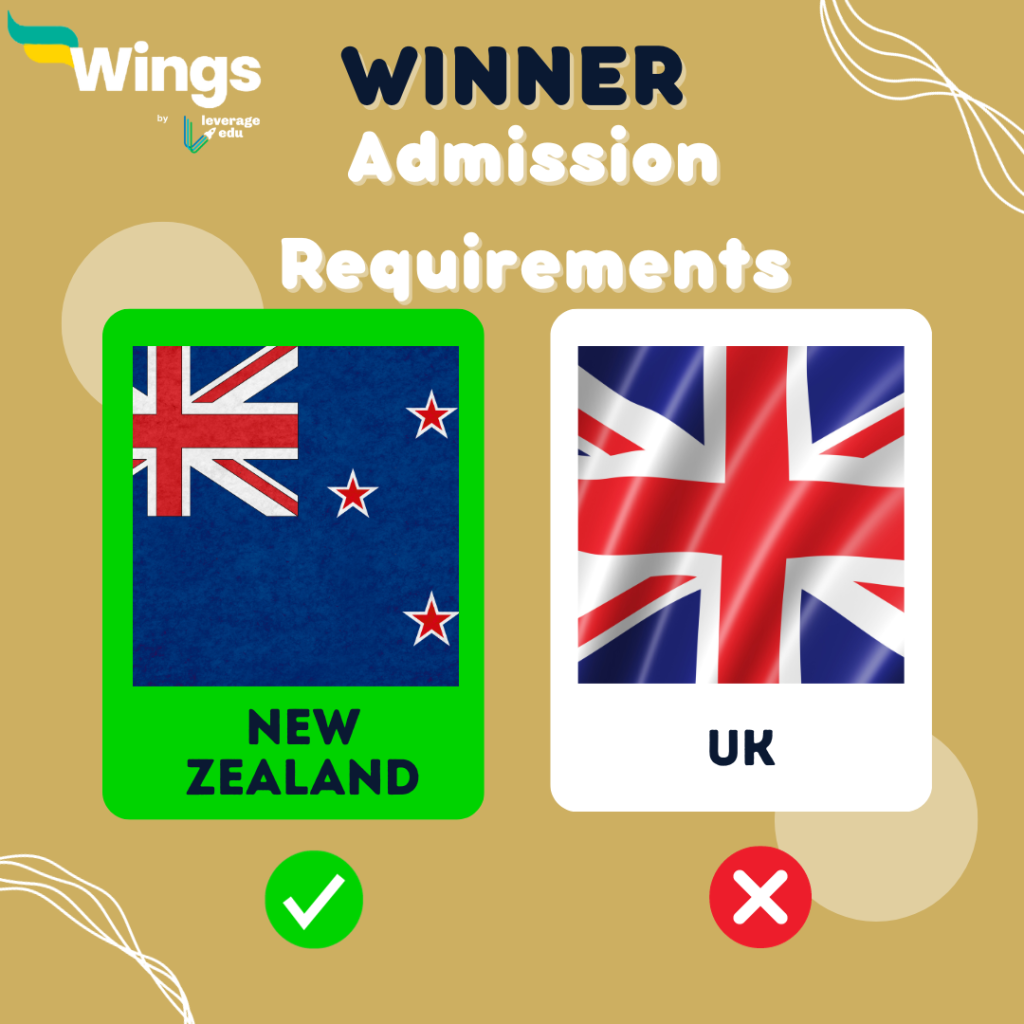
Also Read: Best MBA Colleges in UK
Tuition Fees
In this section, we will determine which country has the lowest cost of education. +2 points will be awarded to the country with the lowest cost of education. So, let us compare tuition fees in the UK and New Zealand.
Tuition Fees in the UK
As per the websites of the universities in the UK, the average annual tuition fees in the country are as follows:
| Study Program | Average Annual Tuition Fee |
| Undergraduate | £8,000 – £30,000 |
| Postgraduate | £12,000 |
| Doctoral | £20,000 – £50,000 |
Tuition Fees in New Zealand
As per the websites of the universities in New Zealand, the average annual tuition fees in the country are as follows:
| Study Program | Average Annual Tuition Fee |
| Undergraduate | NZ$20,500 – NZ$25,000 |
| Postgraduate | NZ$19,000 – NZ$50, 000 |
| Doctoral | NZ$6,500 – NZ$9,000 |
Which Country is Better?
The tables above illustrate that the tuition fees in New Zealand is way more expensive than in the UK. As a result, we will give a +2 score to the UK in this round of UK vs New Zealand contest.

Also Read: Masters in Civil Engineering in UK
Living Expenses
The cost of living is one of the main concerns that foreign students have when deciding on a study-abroad destination. So, let’s compare the cost of living in the UK and New Zealand.
Cost of Living in the UK
The cost of living in the UK according to Numbeo is provided below:
| Monthly Rent | £723.47 – £1,606.95 |
| Average Apartment Price (Price per Square Metre) | £3,333.25 – £4,456.38 |
| Average Cost of an Inexpensive Restaurant Meal | £15 |
| Average Transportation Cost | £67.9 |
| Average Cost of Utility (Monthly) | £252.75 |
Cost of Living in New Zealand
The cost of living in New Zealand according to Numbeo is provided below:
| Monthly Rent | NZ$1,538.83 – NZ$3,061.61 |
| Average Apartment Price (Price per Square Metre) | NZ$8,995.46 – NZ$10,827.41 |
| Average Cost of an Inexpensive Restaurant Meal | NZ$25 |
| Average Transportation Cost (Monthly) | NZ$176.01 |
| Average Cost of Utility (Monthly) | NZ$376.17 |
Which Country is Better?
While the cost of homes and transportation expenses can be higher in New Zealand, other important costs like monthly rent, utility, and meal prices are higher in the UK. Hence, the overall living cost is lower in New Zealand than in the UK. So, we will give +2 points to New Zealand for this in our UK vs New Zealand contest.
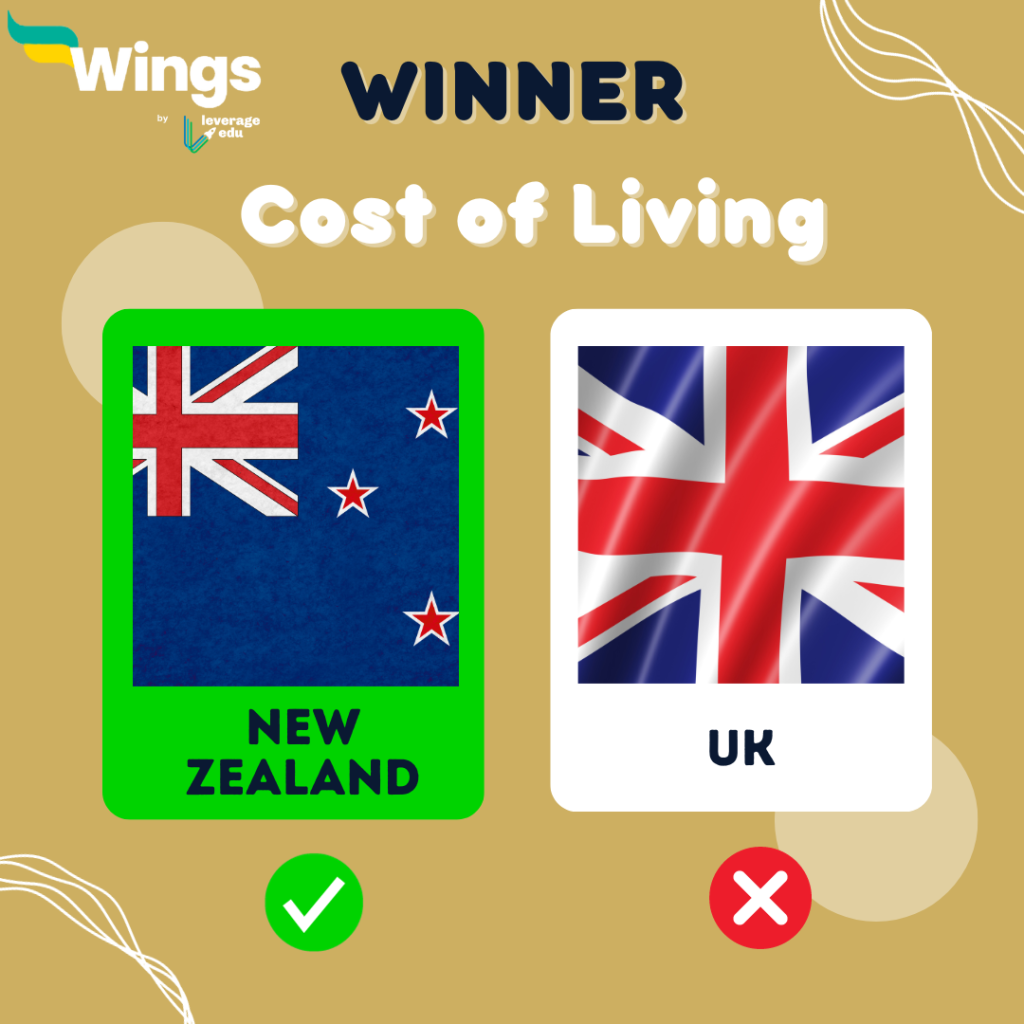
Also Read: BTech in UK
Work Permit and PR
Students often study abroad with the hope of finding work and eventually receiving permanent residency. Let us compare the ease of obtaining a work visa and permanent residency in the UK with New Zealand.
Work Permit in the UK
Here is how a work permit is granted in the UK:
Eligibility Criteria for a Work Permit in the UK
In order to get a work permit in the UK, you need to have:
- Passport & travel history,
- Certificate of Sponsorship,
- UK Job details,
- Educational and business credentials,
- English Language Proficiency, and
- Evidence you are located outside the UK & employed by a non-UK-based company.
Apply for a Work Permit in the UK
A work permit cannot be issued from the UK directly. Your employer must apply on your behalf in the United Kingdom. The duration of your visa will be determined by the nature of your activity and the type of license you obtain.
The work visa is intended for highly trained and qualified foreign workers who can contribute to the United Kingdom’s economic growth and productivity. Entrepreneurs, investors, and extraordinary talent are eligible for this visa category.
This category includes professions of:
- IT specialists;
- Engineers;
- Doctors (Physicians);
- Innovators;
- Scientists;
- Finance experts;
- Entrepreneurs;
- Other
You will get a decision on your work visa within 3 weeks of applying.
PR in the UK
PR is also known as Indefinite Leave to Remain (ILR) in the United Kingdom. In most cases, you must have lived in the UK continuously for at least 5 years before applying for UK PR. The amount of time required to obtain UK PR status is dependent on the type of UK visa you possess.
Work Permit in New Zealand
Here is how a work permit is granted in New Zealand:
Eligibility Criteria for a Work Permit in New Zealand
You are eligible to apply for a temporary work visa in New Zealand if you meet the following criteria:
- You have a job offer from an employer based in New Zealand,
- You are coming for a specified work-related purpose to the country,
- You have a spouse in New Zealand and want to join them and work,
- You belong to a country with a special work programme, or
- You have been studying in New Zealand and now want to work here.
Apply for a Work Permit in New Zealand
You are ready to apply for the New Zealand Work Visa for Indians after satisfying the requirements and organising your paperwork. It is a simple application with only 5 steps to finish.
Step 1: Get a job in New Zealand,
2nd Step: Gather your documents,
Step 3: Submit your work visa application,
4th Step: Sit tight while your visa is processed, and
Step 5: Obtain a work visa.
The processing time for a New Zealand work permit can be anywhere from 3 to 7 months.
PR in New Zealand
You must have spent at least 184 days in New Zealand on a resident visa in each of the two years before your application for permanent residence. This two-year term begins immediately before you apply for permanent residence and does not include the two years since your resident visa was obtained.
Which Country is Better?
As we can see, getting a work visa and PR in New Zealand is easier than in the US. As a result, New Zealand has received a +2 score in this round of our UK vs New Zealand match.
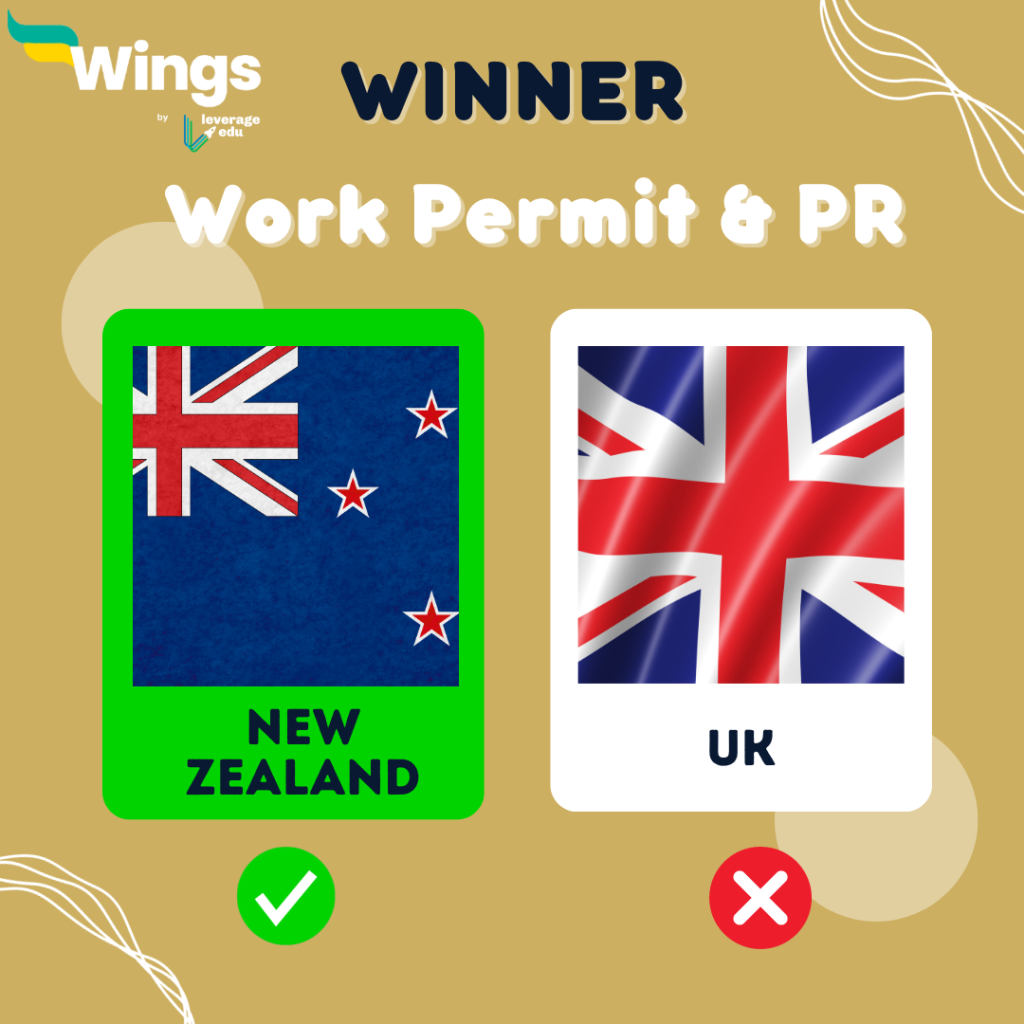
Also Read: Study in New Zealand for Indian Students
Average Salaries: UK vs New Zealand
According to Indeed, the average wage in the UK is £29,500 per year after graduation. On the other hand, the average annual salary for a postgraduate is £30,442. The average salary after finishing graduation is NZ$43,103 per year in New Zealand according to Indeed, while it is NZ$73,953 per year after postgraduation according to Prosple.
Which Country is Better?
It is apparent that the average salaries in the UK is much higher than in New Zealand. Hence, the UK receives a +2 score in this round of our UK vs New Zealand contest.
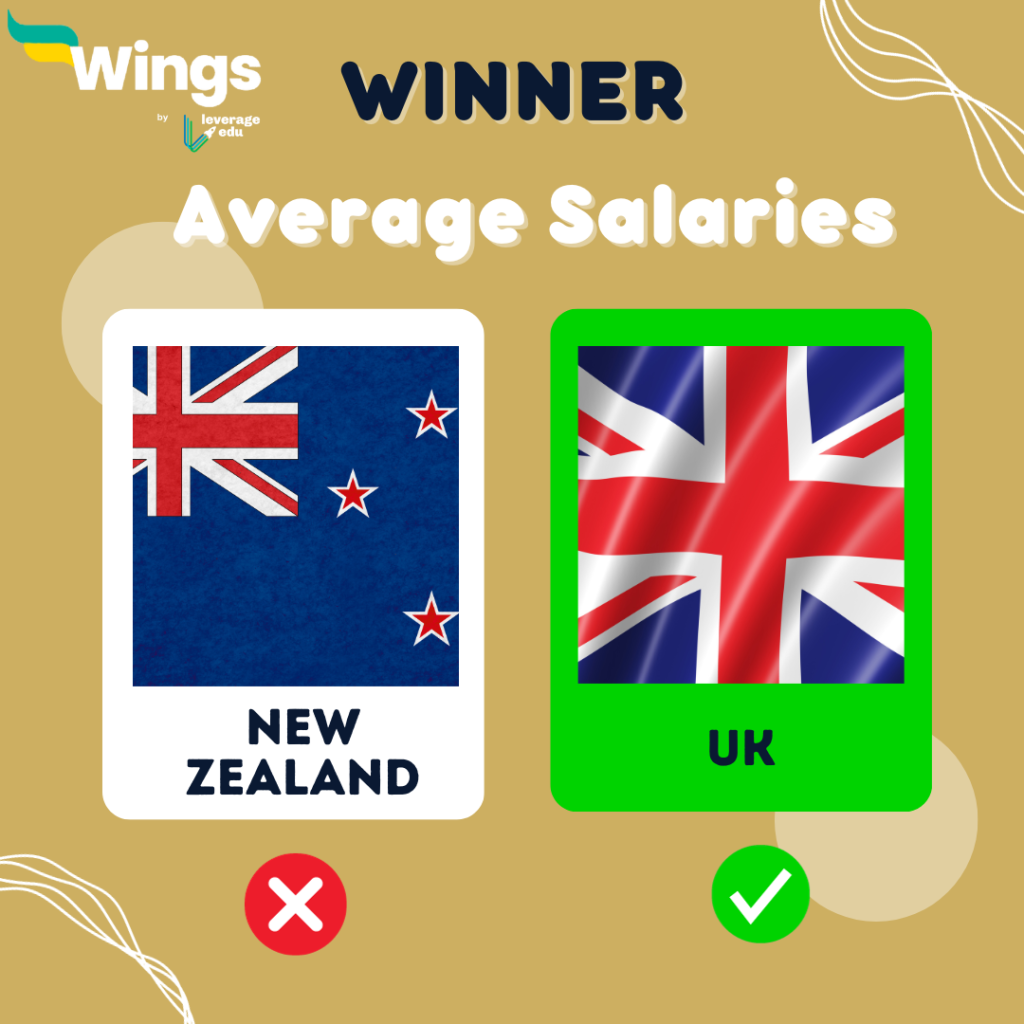
Also Read: Medical Colleges in New Zealand
Other Major Elements
Let’s have a look at some other important factors that we need to consider while picking where to study abroad. These essential factors are listed below:
Climate
New Zealand’s average temperature ranges from around 10°C in the south to 16°C in the north. The climate in the region is temperate, with little seasonal variation. The United Kingdom, on the other hand, has hot summers and cold winters.
Safety
Both the United Kingdom and New Zealand are among the safest countries in the world. This makes both of them ideal countries for pursuing education and seeking employment.
Culture for International Students
New Zealand and the United Kingdom are similar in that they are both predominantly English-speaking countries with stunning beauty and a shared history. Because of these connections, many British expats find the transition from the UK to New Zealand to be rather easy.
Also Read: 100 Interesting Facts About New Zealand
Conclusion
If we calculate the scores of the UK and New Zealand, we find that the UK and New Zealand both have received 6 points.
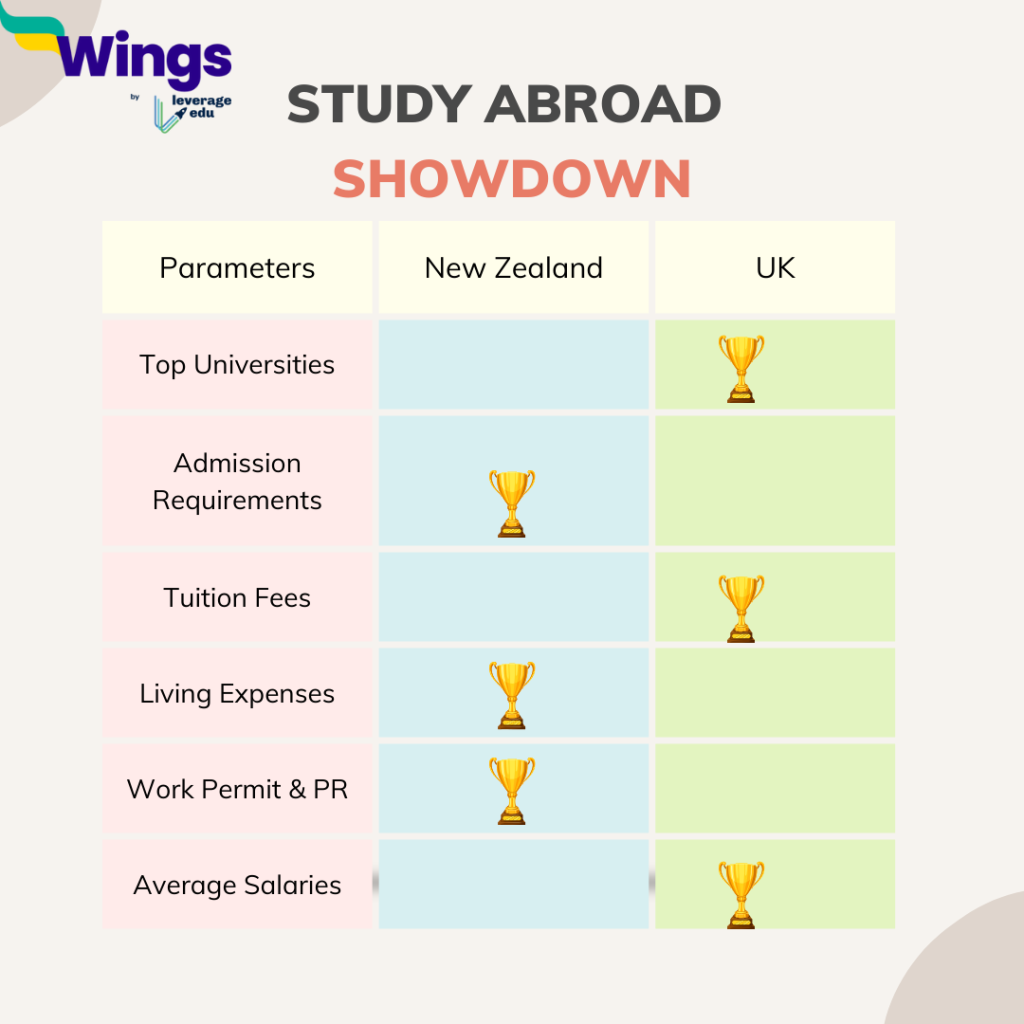
However, it is vital to recognise that both the UK and New Zealand have advantages and disadvantages. Before applying for admission to any country’s institutions, it is recommended that you choose a degree or topic of study.
To make a more educated decision, evaluate the educational facilities and financial help available for your selected degree. Having said that, both the UK and New Zealand are outstanding study-abroad options.
Also Read: Universities Accepting Backlogs in New Zealand
FAQs
Ans. New Zealand is far more tranquil and has much easier access to nature. People in both nations are kind and have a fantastic sense of humour. Both nations are home to some of the most prestigious universities in the world.
Ans. The two countries are linked through mutual migration, a shared military history, a government system, and head of state, as well as language and Commonwealth (previously British Empire) membership.
Ans. Summers in New Zealand are often warmer than in the UK, but not by much unless you live in the north. Winters in New Zealand are generally milder than in the UK unless you live in the southern part of the island. It rains as much, if not more than it does in the UK.
So, this was all about the UK vs New Zealand. Many Indian students dream of pursuing education in foreign nations due to the exposure and career growth they offer. Consider joining a free counselling session with Leverage Edu if you plan to study abroad.


 One app for all your study abroad needs
One app for all your study abroad needs











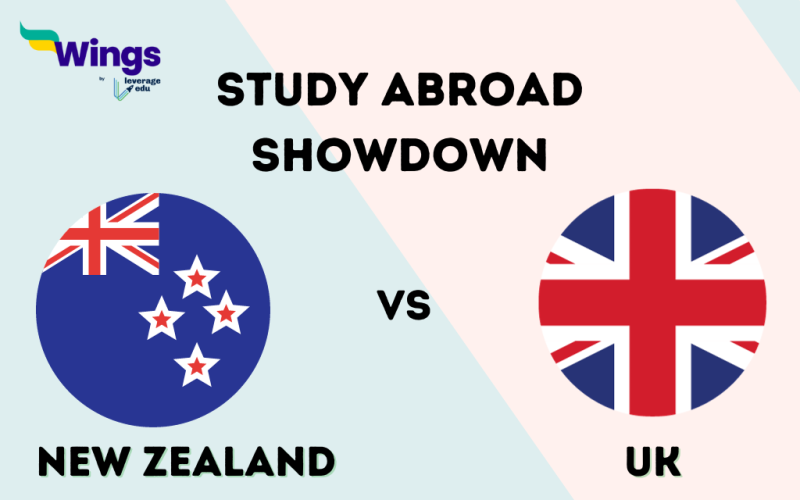
 60,000+ students trusted us with their dreams. Take the first step today!
60,000+ students trusted us with their dreams. Take the first step today!